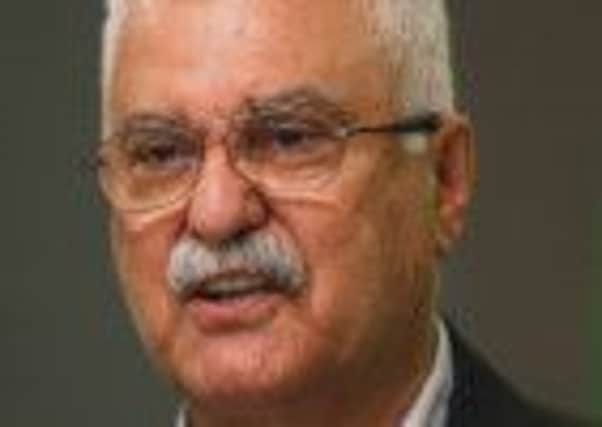Syria: 22 killed in Qusair fighting, dozens wounded


The UK-based Syrian Observatory for Human Rights said at least 22 people, including 18 rebels, were killed in the fighting in Qusair, and dozens were wounded.
Pro-Assad troops, including fighters from the Lebanese Shia militia, Hezbollah, have been trying to push rebels out of Qusair. Syrian state media said troops gained ground, but activists have denied regime gains and said rebel fighters were defending their positions.
Advertisement
Hide AdAdvertisement
Hide AdQusair is important to Assad because it sits on a land corridor linking two of his strongholds, the capital Damascus and towns on the Mediterranean coast. For the rebels, holding Qusair means keeping open a supply line to Lebanon, six miles away.
Yesterday’s barrage of rockets, mortar rounds and tank shells began after daybreak, said Qusair activist Hadi Abdullah and the pro-opposition Observatory. Both said it was the most intense shelling since the regime launched its offensive a week ago. They also reported heavy gunfire.
The intense shelling could be heard in Lebanon’s border areas and in the Syrian city of Homs, some 15 miles away.
The fighting over Qusair has highlighted Hezbollah’s growing role in Syria’s civil war. The militia tried to play down its involvement, but could no longer do so after several dozen of its fighters were killed in Qusair and buried in mass funerals in Lebanon.
In Turkey, the acting president of Syria’s main opposition group harshly criticised Hezbollah for its role in Qusair. “Some Lebanese are being sent to Syria as invaders in order to return back home in coffins draped with shame,” said George Sabra, of the Syrian National Coalition.
“Oh Syrians, come and rescue Qusair, Maadamiyeh, Daraya and eastern Ghouta so that Syria remains, as it is today, a graveyard for invaders,” Sabra said, referring also to Damascus’ suburbs where Syrian troops have been on the offensive over the past weeks.
In an indication that the rebels’ stand is also becoming a symbol outside Syria, Mohammed al-Zawahiri, who is the brother of al-Qaeda leader Ayman al-Zawahiri and a prominent jihadi figure in Egypt, issued a statement alongside 19 other ultra-conservative Islamists and former militants to all Muslims to “help our people in Qusair”.
“It is the duty of each Muslim to repel this aggression and stop the injustice, first by jihad with arms,” the statement, carried by a militant website, said.
Advertisement
Hide AdAdvertisement
Hide AdYesterday’s push comes ahead of a speech by Hezbollah chief Hassan Nasrallah, his first since the offensive began. The speech is to mark the anniversary of Israel’s May 2000 withdrawal from southern Lebanon, commemorated each year by Hezbollah as a major military victory.
However, this year’s anniversary comes at a time when Hezbollah is facing growing criticism in Lebanon for its involvement in the Syrian war.
The Syrian fighting has repeatedly spilled over into Lebanon, whose sectarian divide mirrors that of Syria. Assad opponents and supporters have been clashing for the past week in the Lebanese port city of Tripoli, using mortars, grenades and machine guns to attack populated areas.
Four people were killed by sniper fire yesterday, bringing the week’s death toll to 29, including three Lebanese soldiers, said a Lebanese official. More than 200 people have been wounded.
The fighting pits the predominantly Sunni Muslim district of Bab al-Tabbaneh against Alawites, followers of an offshoot of Shia Islam, in the adjacent Jabal Mohsen area. Assad is an Alawite while most rebels are Sunnis.
Hezbollah, which depends on Shia Iran for weaponry, is also facing repercussions in Europe over its support for the Syrian military.
Earlier this week, France and Germany joined a push by Britain to have the European Union declare Hezbollah’s military wing a terrorist organisation. Such a move, long sought by the US, would hamper Hezbollah operations in Europe.
Late on Friday, Hezbollah’s deputy chief, Sheikh Naim Kassem told the Lebanese TV station Al-Mayadeen that the EU would make a “big mistake,” but that such warnings did not worry the group. He would not elaborate.
Advertisement
Hide AdAdvertisement
Hide AdMeanwhile, Syria’s fractured political opposition was meeting for a third day in Istanbul, Turkey, yesterday to elect new leaders, try to widen its base and forge a unified position ahead of possible peace talks with the regime.
The US and Russia want to bring together representatives of the opposition and the Syrian government at an international conference in Geneva for talks on a possible transition government. Much remains up in the air, including the date, the agenda and the participants. On Friday, Syria ally Russia said the Assad regime agreed in principle to attend the talks, but Damascus did not confirm this. The opposition is deeply suspicious about Assad’s intentions and senior opposition figures have ruled out attendance unless Assad’s departure tops the agenda of such talks.
SEE ALSO: